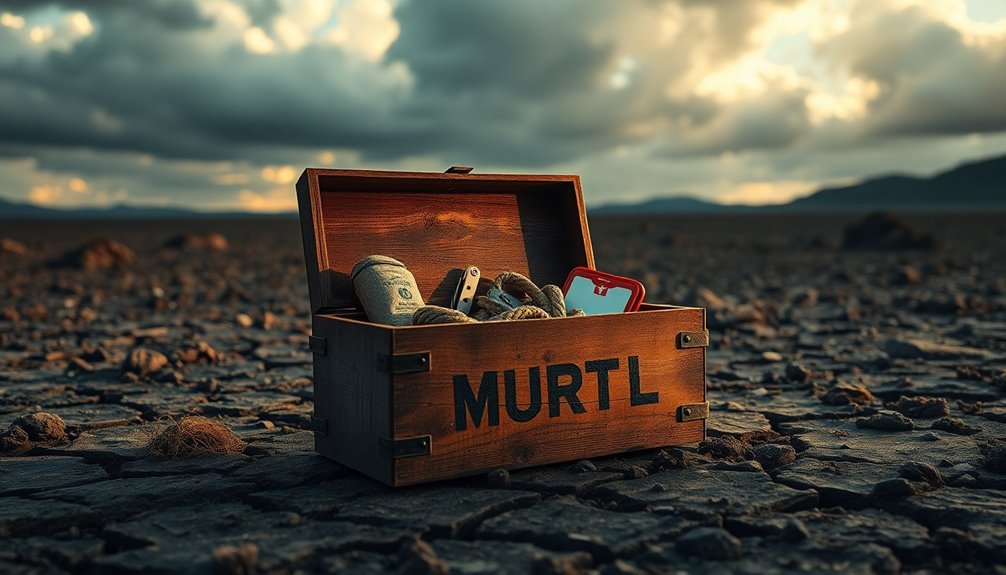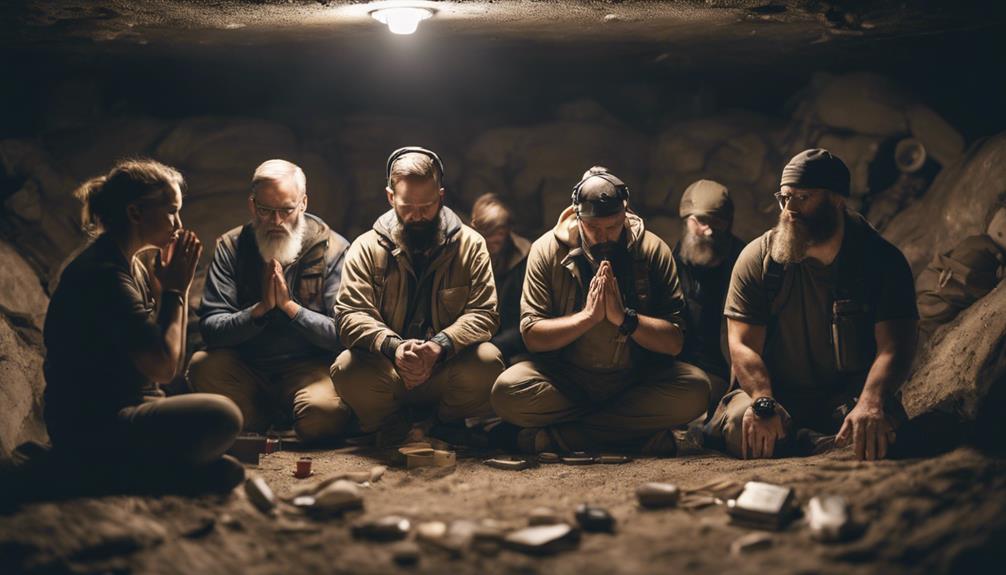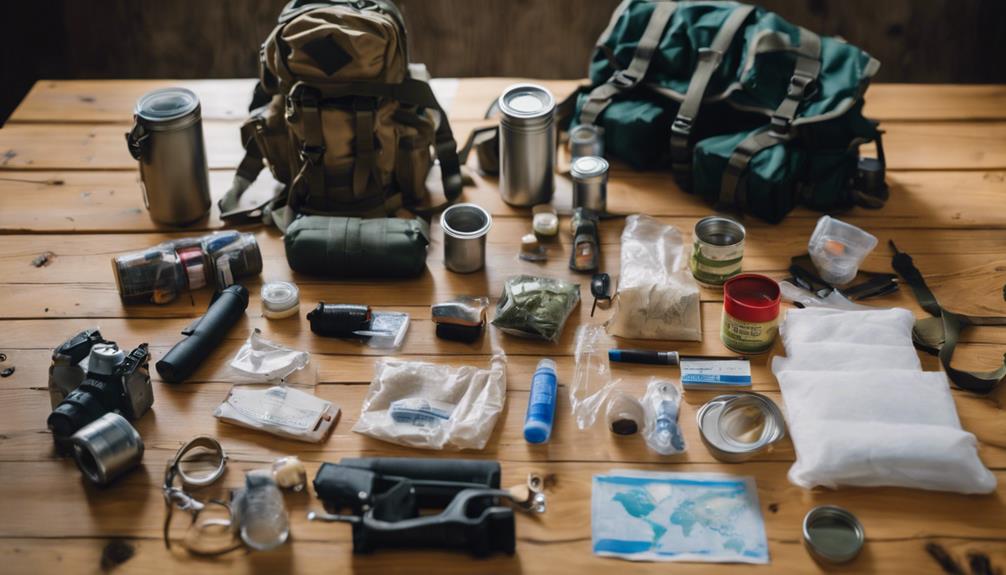Preparing for a possible society collapse is super important, and you can totally do it! Start by stocking up on essential supplies like non-perishable foods and enough water—aim for one gallon a day. Learn critical survival skills like gardening, first aid, and even self-defense to help you stay safe and healthy. It’s also smart to plan where you’ll go if you need to leave quickly—think about safe routes and emergency spots. Don’t forget, staying calm and having fun activities can keep your spirits high. Keep going, and you’ll uncover even more tips to boost your survival skills! Make sure to create a survival checklist to keep track of your progress and ensure you have everything you need. Include items like a first aid kit, flashlights, batteries, and a multi-tool. Remember, the key to surviving a potential society collapse is being prepared and adaptable, so keep learning and honing your skills. With the right mindset and preparation, you can face any challenge that comes your way.
Key Takeaways
- Stockpile essential supplies, including non-perishable food and water, to sustain yourself for at least two weeks during emergencies.
- Develop critical survival skills, such as first aid, gardening, and bush crafting, to enhance self-sufficiency and adaptability.
- Create a comprehensive bugging in and bugging out plan, including emergency kits and safe meeting points, to ensure quick responses to threats.
- Establish a strong support network within your community for sharing resources, skills, and emotional assistance during crises.
- Foster mental preparedness through stress management techniques and resilience-building exercises to navigate challenging situations effectively.
Essential Supplies for Survival
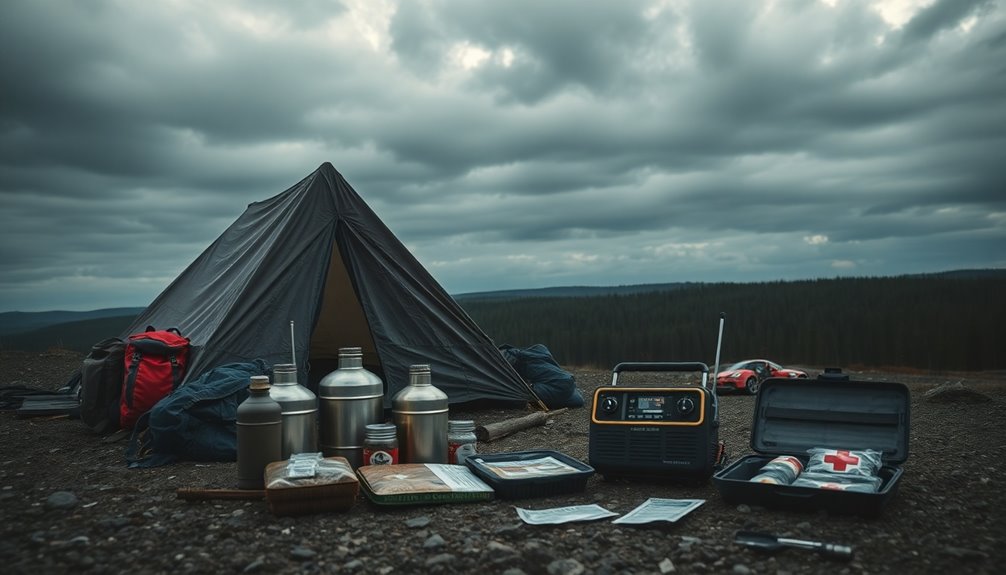
When disaster strikes, having the right supplies can make all the difference in your survival. First and foremost, you need food and water. Stock up on non-perishable items like canned goods, granola bars, and dried fruits. Aim for a three-day supply for evacuation and two weeks if you're staying put. Foraging for wild edibles can also supplement your food supply in an emergency. Additionally, consider the importance of sustainable wood fuel for heating, especially in prolonged emergencies where power sources may be limited.
For water, keep one gallon per person, per day. You'll want to pack enough for three days when evacuating and two weeks at home.
Now, let's talk about first aid! A basic first aid kit is essential, so include bandages, antiseptics, and pain relievers. Don't forget a week's supply of any prescription medications you need.
Lighting and communication are super important too! Grab some flashlights, extra batteries, and a battery-powered or hand-crank radio. A whistle can help signal for help if needed. Regularly reviewing and updating your supplies is crucial to ensure they remain effective and relevant.
Finally, think about shelter and hygiene. An emergency blanket or sleeping bag can keep you warm, while sanitation items like toilet paper and hand sanitizer will keep things clean.
With these supplies ready, you can face challenges head-on, feeling confident and prepared. You've got this!
Critical Survival Skills
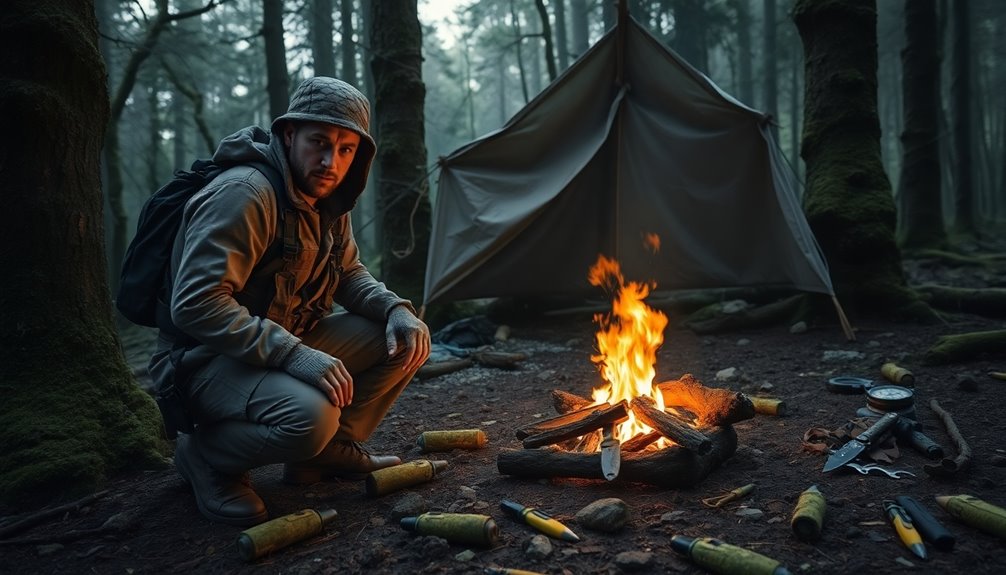
Survival in a crisis hinges on mastering critical skills that can make all the difference between life and death.
First, you'll want basic handyman skills, like carpentry and plumbing, to fix things around you. Imagine a leaky pipe or a broken chair—you can handle it! Improvisation of tools and materials may also be necessary when resources are scarce.
Medical training is also key. Knowing CPR and how to treat wounds could save lives in emergencies.
Gardening and farming are super important too! Starting a garden means you can grow your own food, helping you stay nourished over time.
Don't forget bush crafting! You'll need to know how to make a fire, build a shelter, and even catch food.
Let's talk safety—combat skills can protect you from danger, while self-defense techniques keep you safe from wild animals or people who may mean harm.
Finally, communication is vital. Learning to use a ham radio can connect you with others when modern methods fail.
Bugging In Strategies
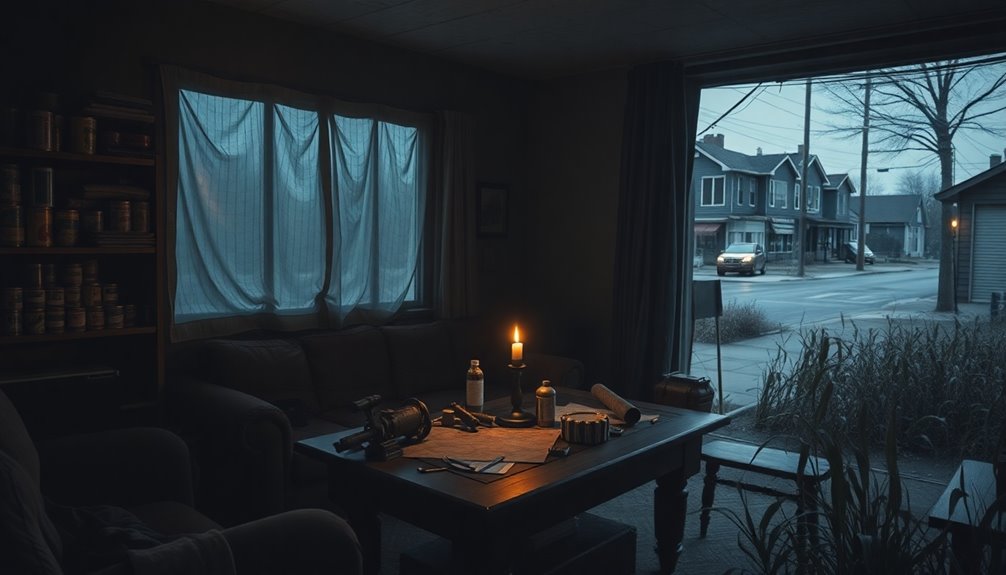
Preparing to bug in requires a proactive approach to ensure your home becomes a fortress during a crisis. Start by identifying potential threats, like natural disasters or pandemics, and create a plan for your family. Assign roles to each household member so everyone knows what to do, making it smoother when tensions rise.
Next, stockpile essential supplies. Fill your pantry with non-perishable foods and ensure you have plenty of water on hand. Don't forget basic medical supplies, too! You'll want to have backup utilities, like flashlights and batteries, in case of power outages.
Now, let's talk about security. Reinforce your home by securing windows and doors, and maybe even setting up a few creative defenses. It's wise to learn self-defense skills, just in case. Identifying a secure room for shelter and storage of supplies is also critical for effective protection.
Communication is key, so stay informed through various media and have a plan for staying in touch with your family. Building a strong community network can also provide extra support.
Lastly, add some comfort items to your stash, like books and games, to keep spirits high! Remember, with the right preparation, you can turn your home into a safe haven.
Bugging Out Strategies
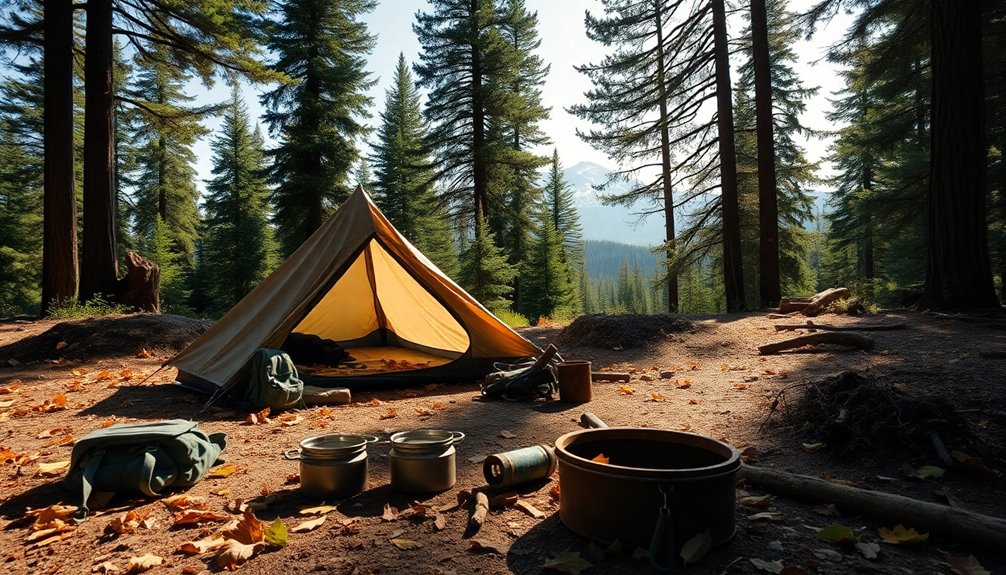
Bugging out can be a daunting prospect, but having a solid strategy makes all the difference. First, pack an emergency kit, which should include non-perishable food, water, medications, and first aid supplies. You'll want at least 72 hours of food, plus a way to purify any water you find along the way.
Don't forget a makeshift shelter, like a tarp or lightweight tent, to keep you safe and dry! Additionally, ensure that you have a plan for waste management to maintain hygiene during your journey.
Next, plan your route and destination. Choose a safe location near a clean water source, and avoid high-risk areas like flood zones. Scout your route ahead of time, if possible, to spot any potential hazards. Always have alternative routes ready, just in case.
Logistics matter too! Make sure you have enough food and water along the way. Wear sturdy footwear and pack hygiene supplies to stay healthy.
When it's time to bug out, stay calm and keep a positive attitude. Work together with your group, and be ready to adapt to any surprises. With these strategies in mind, you'll be well on your way to a successful bug-out experience!
Communication and Evacuation Planning
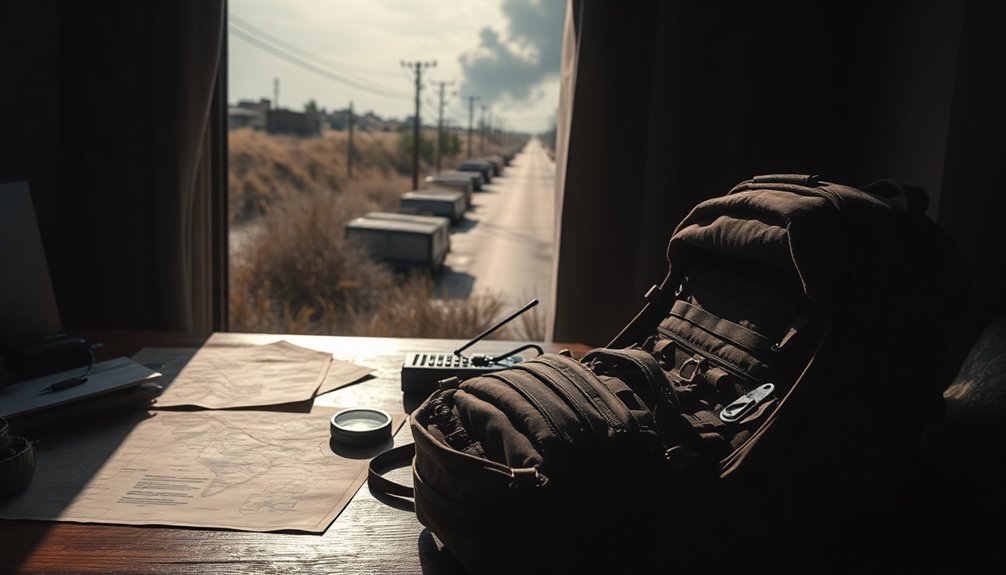
Effective communication and careful evacuation planning are crucial when facing SHTF scenarios. You'll want to stay connected and know where to go!
First, grab a small, portable hand-crank survival radio. This nifty gadget doesn’t need batteries, so it’s perfect for listening to important updates during emergencies. For chatting with your survival buddies, consider using walkie-talkies or GMRS/FRS radios. Everyone should have one to make quick decisions and stay organized. Ham radios are also an excellent option for long-distance communication in survival situations. In addition to communication devices, it’s essential to have a portable survival crate filled with essential supplies such as first aid kit, water purification tablets, fire-starting tools, and non-perishable food. It’s important to always have a well-stocked crate nearby in case of emergencies. This way, you can quickly grab it and head to safety without having to search for each item individually.
Now, let's talk about evacuation. Pick a safe meeting point outside the danger zone, and make sure everyone knows where it is. It's like a secret clubhouse, but for emergencies!
Also, map out your escape routes. Choose a main route and some backups, and be sure to check for any obstacles along the way—like those pesky roadblocks.
Lastly, create a communication plan for emergencies. You might need to text or send signals if phone lines go down.
Self-Sufficiency Techniques
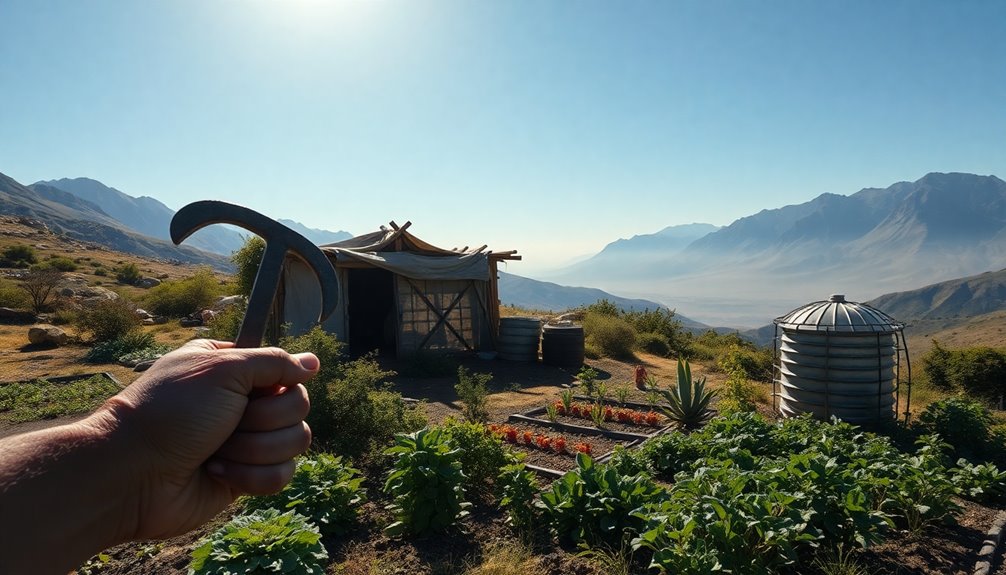
Once you've got your communication and evacuation plans in place, the next step is to focus on self-sufficiency techniques that can help you thrive in any SHTF situation.
First, think about growing your own food! You can use containers or small garden plots, even if you live in an apartment. Check out inspiring garden accounts on Instagram for tips. Foraging is another fantastic way to gather food; you can find berries, nuts, and mushrooms if you know where to look. Learning to raise chickens or goats can provide you with fresh eggs and milk, too! Additionally, growing food from seeds fosters independence in food sourcing and enhances your self-sufficiency. Consider incorporating survival gear to aid in food gathering and preparation. To ensure a sustainable food supply, consider adding Aloe Vera plants which can thrive in various conditions and provide health benefits. Engaging in foraging activities can also help you discover edible wild plants that are nutritious and beneficial.
Next, mastering basic cooking skills is essential. Baking bread from scratch can be a fun adventure! Preserving your harvest through canning or fermenting helps you save food for later. Making your own foraging toys for pets can also provide mental stimulation and enhance their happiness, which is crucial during stressful times.
Don't forget about water! Boiling it for five minutes can kill nasty germs. You can also collect rainwater or use filters to make it safe to drink.
Lastly, stock up on basic tools and learn DIY repairs. It's like being a superhero, fixing things around your home!
With these techniques, you'll be well on your way to being self-sufficient and ready for anything!
Mental Preparedness and Resilience

Building mental preparedness and resilience is crucial for navigating any crisis successfully. Imagine facing a tough situation and staying calm like a superhero! You can develop a survival mindset by practicing breathing exercises to manage stress. When you feel anxious, take a deep breath in, hold it, and then let it out slowly. This simple trick can help you feel better! Additionally, embracing the Law of Attraction can enhance your ability to maintain a positive outlook during challenging times, as visualization techniques can help you imagine overcoming obstacles.
Engaging in regular physical activity, like running or dancing, not only keeps your body fit but also strengthens your mind. Regular self-reflection can lead to personal growth and improved mental resilience. Remember, it's okay to feel emotions—recognizing them helps prevent problems down the road. Talk to a friend or therapist when you need to unload; it's like letting out steam from a pressure cooker! Establishing a support network for emotional assistance is vital for mental health, and participating in trust-building activities can further enhance these connections. Additionally, cultivating a strong sense of risk management can help you navigate uncertainties more effectively.
Building self-belief is essential too. Focus on your goals, and don't let little setbacks trip you up—think of them as stepping stones! Surround yourself with a supportive community, where you can share skills and ideas.
Practicing situational awareness lets you spot dangers before they catch you off guard. Finally, train your mind by envisioning success; this will prepare you for anything! So, gear up and get ready to conquer challenges like a champ!
Frequently Asked Questions
How Can I Assess My Current Survival Readiness?
To assess your current survival readiness, start by checking your emergency supplies. Make sure you've got enough water, food, and a first aid kit.
Next, map out safe spots in your home and practice escape routes with your family. Don't forget to write down important phone numbers!
Lastly, think about your community's resources and how they can help during tough times.
What Types of Emergencies Should I Prepare for Specifically?
You should get ready for different emergencies!
Think about natural disasters like hurricanes, earthquakes, and floods, which can mess up your home and supplies.
Don't forget health crises, like pandemics, that can make people sick.
Also, consider economic troubles, where jobs might vanish, and essential goods become scarce.
Lastly, social and political instability can lead to chaos.
How Do I Create a Survival Plan for Children?
Creating a survival plan for kids can be fun and exciting! Start by packing a special survival kit with snacks, a water bottle, and their favorite toy to keep them comfy.
Next, teach them cool skills like building a shelter or starting a small fire.
Don't forget to practice your plan together! Roleplay different scenarios, so they know what to do.
It's like an adventure, and you'll both feel ready for anything!
What Are the Best Ways to Stay Informed During a Crisis?
To stay informed during a crisis, you can follow a few fun and easy steps!
First, check reliable news apps or websites for quick updates.
Next, sign up for emergency alerts via text or email, so you're always in the loop!
Don't forget to follow local social media pages— they often share important news too!
Lastly, talk to friends and family about what they've heard; sharing information keeps everyone safe and prepared!
How Can I Maintain Mental Health During Long-Term Survival Situations?
To keep your mental health strong during tough times, focus on self-care! Make sure you eat well, sleep enough, and take breaks to relax.
Stay connected with friends or family, even if it's just a quick chat. Practice self-compassion; it's okay to feel overwhelmed sometimes!
Try fun activities you enjoy to boost your mood. Lastly, breathe deeply and remind yourself that you can handle challenges—you're stronger than you think!
Conclusion
So, are you ready to tackle any situation that comes your way? By gathering essential supplies, mastering survival skills, and planning your escape routes, you'll be well-prepared to outlast any challenge! Remember, staying calm and positive is just as important as having the right gear. Think of it like a big adventure, where you're the hero! With a little planning and a lot of heart, you can thrive no matter what happens. So, go ahead and get started!



